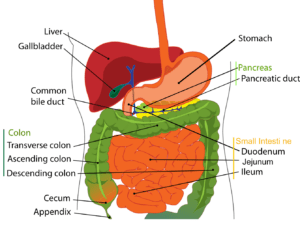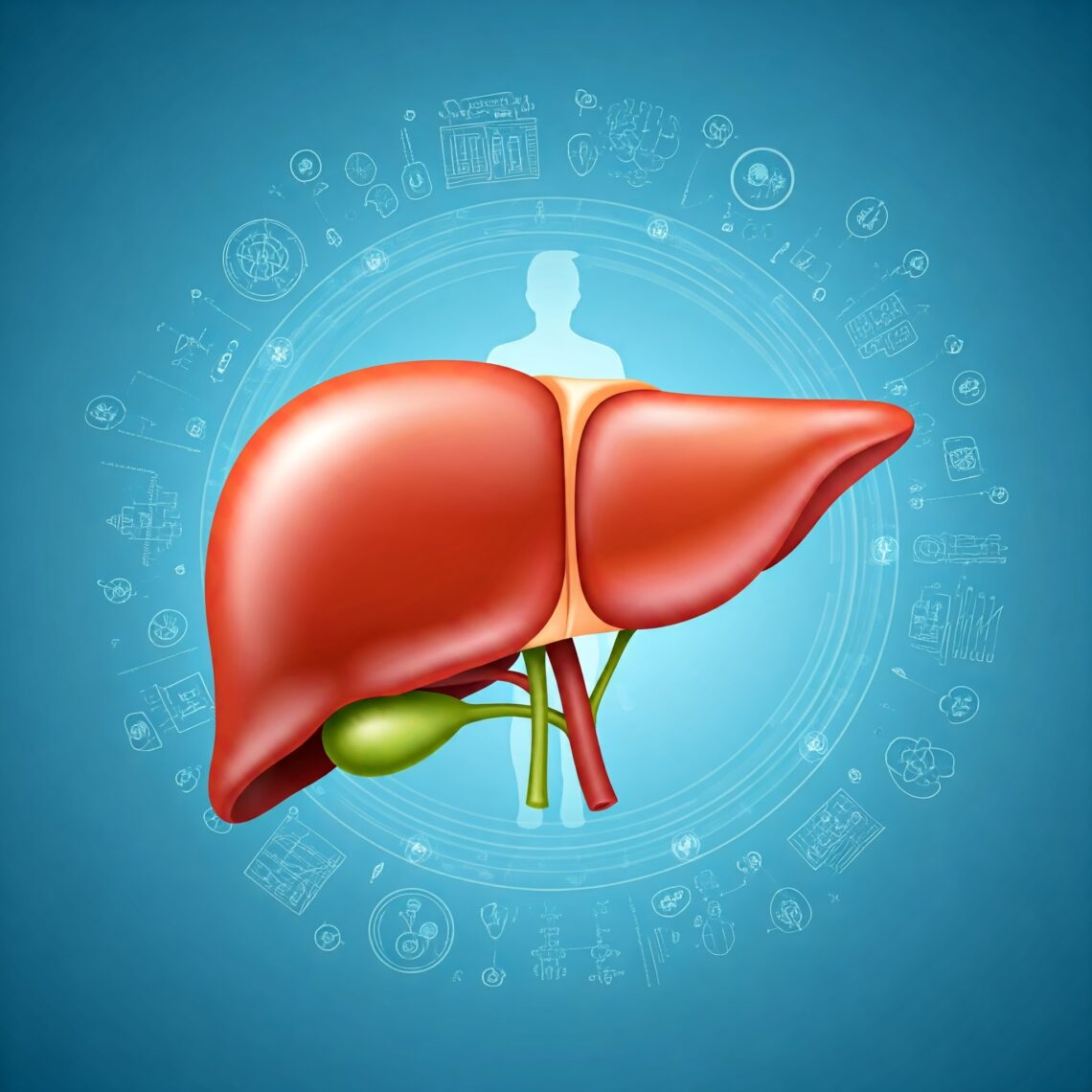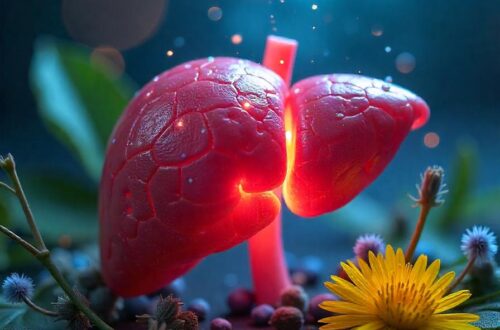Why is Liver Health Important?
The liver is a vital organ that supports the body’s essential functions. It is located in the upper right of the abdomen, adjacent to the diaphragm, and to the right of the stomach.

Maintaining a healthy liver is necessary for overall well-being since it is associated with many crucial physiological processes related to detoxification, metabolism, nutrient storage, protein synthesis, and immunity.
The essential functions performed by the liver include:
- Purifying blood: removal of bacteria, toxins, and waste products from the blood.
- Producing bile: to help in digesting fats.
- Regulating metabolism: helps in converting food to energy and stores the excess energy.
- Producing ketones: to supplement the body’s energy requirements during fasting or low-calorie intake.
- Storing nutrients: stores vitamins and minerals and supplements the body’s needs whenever needed.
- Producing proteins: including albumin for maintaining blood pressure, enzymes, carrier proteins, immune proteins, and clotting factors.
- Maintaining blood sugar levels: by controlling the blood glucose levels.
- Supporting immunity: through functions including filtering blood, regulating inflammation, metabolizing drugs, and producing immune proteins.
- Maintaining homeostasis: by regulating various body functions, including regulating blood sugar levels, producing hormones, filtering blood, and maintaining fluid balance.
When the liver is not functioning properly due to damage or illness, various health problems arise, including:
- Fatigue due to the liver’s inability to filter blood effectively.
- Jaundice, yellowing of the skin and eyes due to liver damage.
- Nausea and vomiting due to inflammation, fluid buildup, hormonal imbalances, drug interactions, or pain.
- Abdominal pain due to many liver issues, including inflammation, enlargement, fluid buildup, gallstones, or internal bleeding.
- Bleeding, caused by the liver’s inability to produce clotting factors.
- Brain-related issues affecting memory, mood, or sleep due to liver damage.
- Liver failure due to untreated or chronic liver damage.
If any of these issues arise or persist, you should immediately seek medical help.
Primary Functions of the Liver in the Body
Detoxification
The liver performs detoxification to filter the toxic substances from the blood, converts them to less harmful compounds, and finally leads to their excretion. The toxic substances that the liver may break include alcohol, drugs, toxins from food, heavy metals, and waste products from the body’s metabolism. Detoxification consists of the following processes:
- Filtering: The liver filters out waste products and toxins from the blood received from the digestive system using a system of specialized cells called hepatocytes.
- Breakdown: The liver enzymes break down the filtered toxins into less toxic compounds to facilitate excretion through urine, feces, or sweat.
- Neutralization: Some filtered-out toxins are neutralized to make them less harmful to the body. For this, the liver produces antioxidants like glutathione, enzymes, bile acids, and proteins like albumin.
Bile Production to Aid Digestion
The liver produces a fluid known as bile to help digestion by breaking down fats. This process involves the following steps:
- Bile production, storage, and release: The bile produced is stored in the gallbladder and then released into the small intestine to process the food.
- Emulsification: The bile breaks down the large fat droplets into smaller droplets.
- Fat absorption: The body easily absorbs the small fat droplets in the small intestine.
- Stomach acid neutralization: The bile helps neutralize stomach acid to protect the small intestine from damage.
Metabolism
The liver actively undertakes the body’s metabolic functions, including energy and storage, ketone production, and drug metabolism.
- Energy production: The major sources of energy for the body include carbohydrates, proteins, and fats. The liver breaks down these elements into energy consumed by other body organs.
- Ketone production: When the body faces a scarcity of energy due to fasting or insufficient carbohydrate intake, the liver produces ketones, an alternative energy source.
- Drug metabolism: In this process, the liver breaks down drugs and other foreign substances into less harmful compounds that can be safely eliminated from the body. This process prevents drug toxicity and other ill effects likely to be caused by the presence of drugs in the body for longer than necessary.
Nutrient Storage
The liver undertakes the nutrient absorption and storage process by absorbing various nutrients from the blood and storing them in various compartments within the liver cells.
- Vitamins and minerals: The liver absorbs and stores vitamins A, D, E, K, and B12 and minerals like iron, copper, and zinc. It releases them back into the bloodstream when needed.
- Fat: The liver converts the excess energy (carbohydrates and proteins) into fat and stores it in specialized liver cells. These fats are converted back into calories when the body needs them.
Protein Production
The liver produces many essential proteins that aid in vital body functions, such as maintaining blood volume and pressure, blood clotting, digestion, immunity, transporting nutrients, and hormone production.
- Albumin helps to maintain blood volume and pressure.
- Clotting factors are proteins that facilitate blood clotting.
- Enzymes act as catalysts for various chemical reactions in the body.
- Carrier proteins carry nutrients and other substances throughout the body.
- Antibodies that are proteins supporting the body’s immune functions.
- Hormones that are essential for regulating various body functions, including metabolism and blood pressure.
Blood Sugar Control
Second to the pancreas, the liver plays a crucial role in regulating blood sugar levels through the following processes:
- Storing and releasing glucose: The liver and pancreas regulate blood sugar levels. The pancreas produces glucagon from the excess glucose in the bloodstream, while the liver stores glycogen. When blood sugar levels drop, the liver converts glycogen into glucose and releases it into the bloodstream.
- Gluconeogenesis: The liver produces glucose from amino and fatty acids synthesized from non-carbohydrate sources.
- Responding to insulin and glucagon: Insulin stimulates the liver to store glucose as glycogen, while glycogen stimulates the liver to release glucose into the bloodstream.
Immune Function
The liver plays a crucial role in supporting the immune function in many ways, including detoxification, inflammation regulation, and drug metabolization.
- Filtering blood: The liver performs blood purification, which helps prevent infections.
- Immune proteins: The liver produces antibodies and complement proteins that help the body resist infections.
- Regulating inflammation: This function is vital to the body’s immune response.
- Storing vitamins and minerals: The liver stores many essential vitamins and minerals for immune function.
- Metabolizing drugs: The liver metabolizes many drugs, including those used to treat infections.
Factors Affecting Liver Health
Liver health is essential for overall health and well-being. Due to its importance and the essentiality of its functions, it is crucial to safeguard the liver from adverse factors that may compromise it. The various factors that can influence liver health are lifestyle factors, environmental factors, and medical conditions.
Lifestyle Factors
- Alcohol consumption: Excessive alcohol consumption leads to chronic conditions causing liver damage.
- Unhealthy diet: A diet high in saturated and unhealthy fats, processed foods, and excessive sugar leads to liver health issues.
- Obesity: Increases the risk of fatty liver disease.
- Smoking: Even low to moderate smoking, as well as addiction, leads to chronic liver conditions like liver cancer and liver damage.
- Drug interactions: Certain medications and illicit drugs can harm the liver.
- Lack of physical activities: A sedentary lifestyle can cause liver issues.
Environmental Factors
- Exposure to toxins and pollutants: Toxins like heavy metals, pesticides, industrial chemicals, and wastes can damage the liver.
- Medications: Medications like ibuprofen can damage the liver in excessive doses or prolonged periods.
Medical conditions
- Viral hepatitis: Hepatitis viruses can cause liver inflammation and damage.
- Autoimmune diseases: Diseases like autoimmune hepatitis affect the liver.
- Genetic disorders: Inherited conditions can lead to liver issues.
- Metabolic disorders: Metabolism-related conditions like diabetes and high cholesterol can affect liver health.
Major Liver Diseases
Fatty Liver Disease
It happens when excess fat accumulates in the liver cells due to many reasons, including excessive alcohol consumption, obesity, type 2 diabetes, high triglycerides, genetic factors, or due to drug interactions. Untreated fatty liver can lead to liver cirrhosis or liver cancer.
Hepatitis (A, B, C)
These are viral infections causing inflammation of the liver. Chronic infections result in damage to the liver cells, inflammation, scarring, and other severe issues.
- Hepatitis A is a contagious infection spread through contaminated food or water.
- Hepatitis B spreads through blood and body fluids.
- Hepatitis C spreads through contaminated blood or needles.
If left untreated, hepatitis virus infections result in chronic liver disease and liver failure.
Liver Cirrhosis
It results in scarring and hardening of the liver tissue. Major reasons for liver cirrhosis include excessive alcohol consumption, chronic hepatitis, non-alcoholic fatty liver disease, drug interactions, genetic issues, and an autoimmune disease that affects the bile ducts in the liver. The complications of liver cirrhosis can include liver failure, bleeding, or liver cancer.
Liver Cancer
It happens when malignant tumors grow in the liver. This can be due to many factors, including chronic hepatitis B and C, liver cirrhosis, excessive alcohol consumption, non-alcoholic fatty liver disease, certain food toxins, and genetic factors. While there can be no initial symptoms, advanced stages are characterized by abdominal pain, loss of appetite, weight loss, nausea and vomiting, fatigue, jaundice, itching, and swollen abdomen.
How to Prevent Liver Diseases
Vaccination
Vaccination has been proven effective in preventing hepatitis A and B viral infections. While no vaccine has been invented for hepatitis C, certain precautions, such as practicing safe sex, avoiding sharing needles, syringes, and other injection equipment, and regularly testing for hepatitis C, have been proven effective.
Restricting Alcohol Consumption
This has been a proven measure for preventing most liver diseases. Abstinence or low alcohol consumption can reduce liver damage, prevent fatty liver, lower the risk of hepatitis, decrease the risk of liver cirrhosis, and reduce the risk of liver cancer.
Avoiding Drug Misuse
Many drugs, both prescription and illicit, can be detrimental to liver health. Such drugs may cause direct liver toxicity by damaging liver cells or may cause indirect liver damage by causing fatty liver or hepatitis. Combining different drugs can make them interact with each other, increasing their toxicity to the liver.
Avoiding Toxins
Avoiding exposure to toxins from various sources, including environmental pollutants, contaminated food and water, certain medications, and illicit drugs, can reduce the risks of most liver diseases.
Regular Hydration
Drinking plenty of water or hydrating beverages regularly or when the body demands water is an effective way to stay hydrated and prevent liver diseases. Regular hydration supports liver health by flushing toxins through urine and sweat, maintaining liver functions, preventing gallstones, and supporting overall health and well-being.
Role of Medical Check-ups and Screenings
Regular medical check-ups and periodic liver function tests are essential to track liver health. These preemptive measures ensure early detection of issues and enable timely attention and management.
Liver Function Tests (LFTs)
These are a series of blood tests that measure specific liver-produced enzyme and protein levels in the blood. Abnormal levels may indicate liver damage or disease and necessitate medical follow-up. It is essential to perform LFTs periodically for:
- Early detection of abnormalities hinting at any liver diseases.
- Monitoring liver health, especially when you have a history of liver disease or symptoms.
- Screening for underlying conditions affecting liver health, such as hepatitis or fatty liver disease.
- Assessing the impact of certain medications that carry risks for liver health.
Ensuring Liver Health through a Balanced and Healthy Lifestyle
A balanced and healthy lifestyle is crucial for maintaining liver health and overall well-being. A healthy lifestyle includes a balanced diet rich in nutrient-packed foods like leafy greens, turmeric and omega-3 fatty acid sources such as salmon, flaxseeds, and walnuts. Such a diet will be a rich source of antioxidants, essential for neutralizing harmful free radicals in the liver. Leafy vegetables contain fiber necessary for digestive health, leading to liver health. Omega-3 fatty acids prevent liver inflammation, improving the liver function.
Furthermore, processed foods cause fat accumulation, leading to weight gain, inflammation, and fatty liver disease. The nutritional deficiency in these foods can cause malnutrition, impairing liver functions. Additionally, most processed food items contain harmful additives, preservatives, and artificial colors that can overburden the liver, leading to its dysfunction.
Excessive sugar intake causes a condition known as insulin resistance, leading to fatty liver disease. Both processed foods and excessive sugar can cause liver inflammation, damaging the liver tissue and causing liver disease.
Final Thoughts
A healthy liver is essential for overall well-being. To support liver health, prioritize a balanced diet, perform regular physical activities, and undergo regular medical check-ups. Early detection and treatment of liver issues are crucial for maintaining vitality. Adopting a healthy lifestyle can ensure a long and healthy life, including a vibrant and healthy liver.




